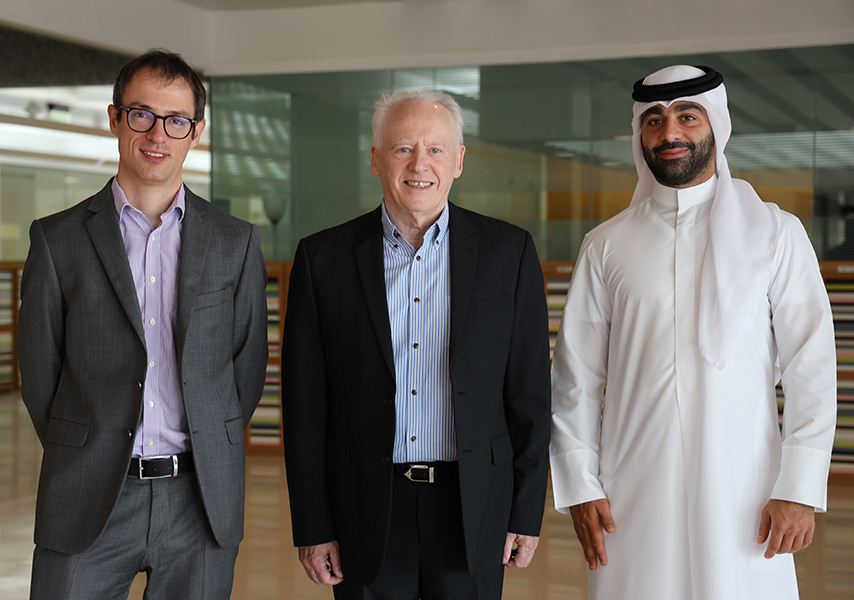A College of Science and Engineering study explores sustainable pathways to food waste eradication by re-engineering the production cycle

According to the Food and Agriculture Organization of the United Nations, food waste and loss accounts for 8 percent of global greenhouse gas emissions. The challenges of finding innovative ways to reintegrate waste and put it into proper use have been heavy.
Professor Gordon McKay and Drs Tareq Al-Ansari and Hamish Mackey, in the Division of Sustainable Development at the College of Science and Engineering, are spearheading the Moistchar project, funded by the Supreme Committee for Delivery and Legacy (SC) in its first phase. The project took first place in the ‘Sustainability’ category in the SC’s Challenge 22 competition, which encourages innovations that can lead to more sustainable outcomes in infrastructure to benefit the 2022 FIFA World Cup™ and its post-tournament legacy.
“Food waste is a major issue both in Qatar and globally, and there are serious environmental impacts associated with the resources that go into food production. Therefore, we want to take the food waste and convert it into a product that we can use to enhance agricultural productivity. Basically, it’s a circular loop system where we put the food waste back into food production,” Dr Mackey explains.
Although composting is a common means of reintegrating wasted food resources back into the production cycle, the solution is not without its problems.
“Composting presents a few issues. For instance, you may need to bring in materials to bulk up the waste material. The other option therefore is to turn the product into biochar which is similar to charcoal - a very carbon rich product that we can put back into Qatar’s soil, which is carbon deficient,” says Dr. Mackey.
Biochar is organic with no chemicals used in the production process. To develop a mineral-rich product, the food waste is put through a process called pyrolysis whereby the waste is dried through a heating process. The process ensures that the char can be applied to soil, which produces a number of subsequent benefits, and enhances the microbial quality of the soil. Most notably, biochar enhances the nitrogen turnover which means agricultural soil would require less fertilizer, and results in the bacteria extracting nitrogen out of the atmosphere.
“One of the reasons we won the award and funding from the Supreme Committee for Delivery & Legacy is that the improvements resulting from biochars enhances the water efficiency of the soil. So, if you have very coarse sandy soil, at the biochar level, it's often finer, which helps to hold the water. But its surface properties also allow it to absorb the water,” Mackey explains.
“So the appeal of the project for the Supreme Committee is how can we reduce the amount of water that's used for irrigation given the number of stadiums being used for the tournament in 2022. We've already done some experiments, though they are very initial at this stage.”
The multidisciplinary CSE team are currently completing the first year of funding, and have been working on a prototype which they have started testing. The app is being developed in phases. The first phase is understanding the drying process, because it's a major energy requirement. Second, considering the different types of waste materials, and different pyrolysis conditions such as temperature, the rate that we increase the temperature and the nitrogen flow rate in the furnace as well.
Dr. Mackey notes that the Moistchar project is making strides towards reducing substantial food waste in Qatar and supporting the country as it works towards achieving its long-term sustainability goals.
The second phase of funding for the project, which was awarded by the Qatar National Research Fund, examines waste from a broader perspective, considering not only food waste but all other types of biomass waste.
“Qatar is striving to become more food self-sufficient and has made big strides in that area in the last couple of years since the blockade. But to produce food requires water and in Qatar, producing water requires a lot of energy. This has been an important objective for the project since the beginning.
This is where we really anticipate the benefits for sustainability; in reducing the overall environmental burdens of food production and landscaping in general to be able to develop a greener urban environment. We also expect other benefits such as a potential new revenue stream, that supports the diversification of our nation’s economy.”





